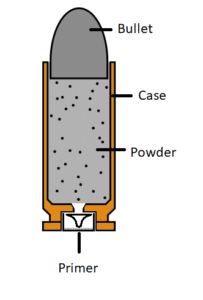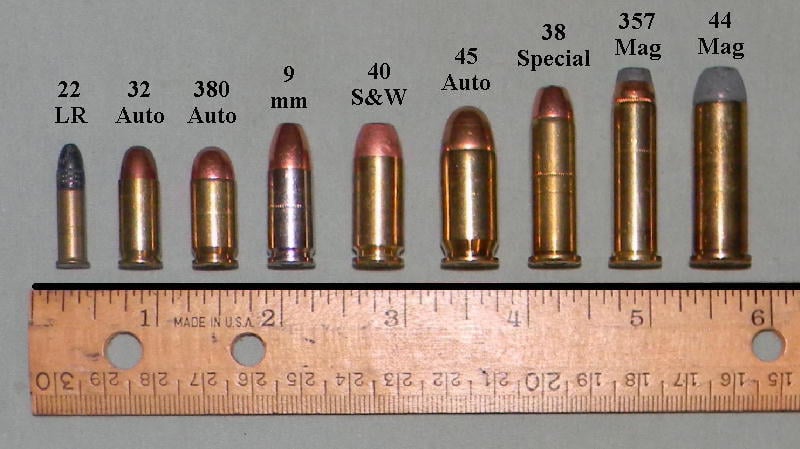|
Pistol Calibers – Comparison of the Most Common Options This article is courtesy of GUNPROS https://gunpros.com/ https://gunpros.com/pistol-calibers/ Pistol Calibers – Comparison of the Most Common Options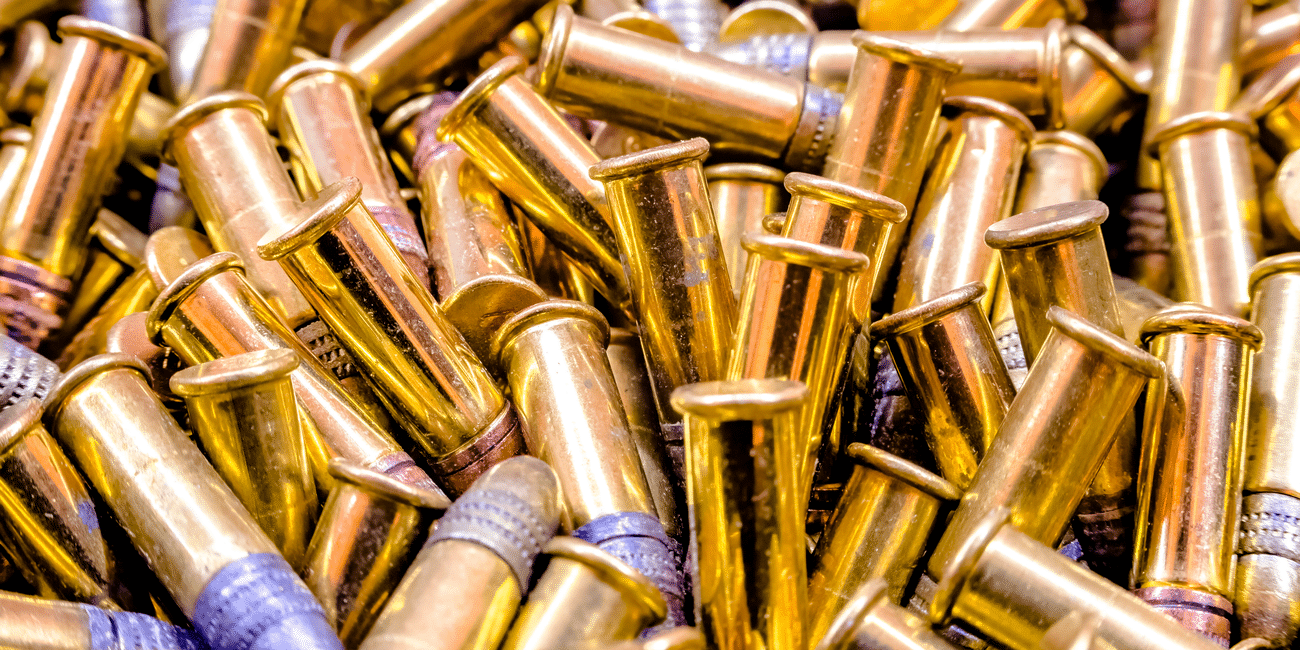 If you're looking to buy a handgun, the first step is determining what caliber you want to purchase. In this guide we'll be covering a variety of common pistol calibers to help you make your decision. What Does Caliber Mean? |
| Ammo Caliber | Estimated Price Per Round |
|---|---|
| .22 LR (.22 Long Rifle) | $0.05-$0.07 |
| .32 ACP (.32 Auto) | $0.38-$0.52 |
| .380 ACP (.380 Auto) | $0.29-$0.43 |
| 9mm (9mm Luger) | $0.19-$0.24 |
| .40 S&W | $0.29-$0.38 |
| .45 ACP (.45 Auto) | $0.28-$0.34 |
| .38 Special | $0.32-$0.40 |
| .357 Magnum (.357 MAG) | $0.42-$0.68 |
| .44 Magnum (.44 Mag) | $0.54-$1.05 |
- The Stopping Power of Your Gun & Ammo. While a variety of factors come into play when determining the stopping power of a gun and its ammo, the larger a bullet, the more likely it is to incapacitate an attacker.
- The Recoil When Firing Your Gun. Though other factors play into recoil, a larger round typically equates to more recoil. Recoil strength affects accuracy because bullets that produce strong recoil will naturally move your aim further away from your target with each shot. Consequently, bullets with more recoil also require you to brace more in order to maintain accuracy.
- The Time Between Shots. The larger recoil caused by larger bullets also means an increased time between shots if you want them to be accurate.
- The Size of Your Gun. Larger diameter bullets require larger diameter barrels. They also require larger magazines in semi-automatic pistols, which gives you more to grip your hand around and potentially more to conceal.
- The Amount of Ammo Your Gun Can Hold. For example, the standard magazine capacity of a Glock G17 handgun is 17 9mm bullets, compared to a Glock G21's magazine capacity of 13 .45 ACP bullets. These two pistols are nearly identical in size.
Determining The Best Pistol Caliber
The best pistol caliber has been endlessly debated on online firearms forums and at gun ranges alike. The truth is, there's really no one-size-fits-all answer. The best handgun caliber for you may be different from what's best for me.
With that said, the following should give you a general idea as to what's best for you.
9mm
9mm is, in my opinion, the best pistol caliber for most people's needs.
Many would consider it the smallest handgun caliber that you can be certain has enough stopping power for concealed carry and home defense. Some prefer .40 S&W or .45 ACP for these purposes, but 9mm offers less recoil, likely better accuracy, and allows for larger magazine capacity. These reasons are enough for the FBI and the majority of United States police officers to justify using 9mm pistols. Most of the United States armed forces are also issued 9mm pistols.
While it might seem a bit loud and surprising for some first time shooters (compared to say .22 LR), I think the vast majority of shooters should easily be able to handle its noise and recoil, so long as they're in reasonable physical shape. There are obviously some exceptions to this. For example, my mother struggles to shoot this caliber using a lightweight compact pistol, though she's not an experienced shooter. Some smaller, older, weaker, or disabled people may also have issues with it.
As the earlier table showed, 9mm is also the cheapest ammo of those considered sufficient for defense. This should hopefully allow you to spend more time practicing with your firearm and improving your skills.
When discussing 9mm pistol ammo, we're technically referring to 9X19mm Parabellum rounds. It's also commonly referred to as 9mm Luger, named after its designer, Georg Luger. If you're at the gun shop or range, you can simply refer to it as "nine millimeter" and they'll know what you mean.
- Common Bullet Weights: 115 gr, 124 gr, 135 gr, 147 gr
- Common Bullet Velocity Range: 950-1200 ft/s
- Common Energy Range: 295-384 ft.lbf
- Price Per Round: $0.19-$0.24
Check out the best 9mm pistols and the best 9mm ammo.
.45 ACP
Perhaps it's a loud minority, but gun enthusiasts seem to LOVE .45 ACP caliber pistols. It's clear visually that the .45 ACP is a solid step up from other common self-defense rounds in terms of its size. With this size comes increased damage to anything in its path.
Personally, I believe that magazine capacity is of greater importance for defense, especially if you were ever attacked by multiple people (though this scenario is extremely unlikely). You can always fit more 9mm rounds into a similarly sized magazine than .45 ACP rounds. Please note that you can NOT actually use ammunition other than what your firearm is intended to use. The point is that similarly sized pistols and their magazines can fit more rounds if they use a smaller caliber.
The FBI seems to echo this sentiment, summarizing, "9mm Luger offers higher magazine capacities, less recoil, lower cost (both in ammunition and wear on the weapons) and higher functional reliability rates (in FBI weapons)," when testing different calibers.
As the FBI mentioned, .45 ACP is also significantly more expensive than 9mm.
Having said all of that, if you want to shoot a pistol chambered in .45 ACP, go right ahead. Many individuals will have little to no problems handling a handgun of this caliber. However, I would not recommend getting the average person started by shooting this caliber, especially those who are hesitant to shoot for the first time.
- Common Bullet Weights: 185 gr, 230 gr
- Common Bullet Velocity Range: 830-1015 ft/s
- Common Energy Range: 333-423 ft.lbf
- Price Per Round: $0.28-$0.34
Here's our list of the best .45 ACP pistols and the best .45 ACP ammo.
.40 S&W
Due to the 1986 FBI Miami Shootout, which led to two killed and five wounded FBI agents, the FBI started looking to replace its standard issue revolver with a semi-automatic pistol. They began testing 9mm and .45 ACP calibers, but then found 10mm rounds to perform best by their metrics.
The FBI enlisted Smith & Wesson to design a 10mm handgun based on the existing large-frame Smith & Wesson model 4506. Smith & Wesson came to the realization that they could reduce the size of the 10mm cartridge by downsizing its primer. With the help of Winchester, Smith & Wesson created the .40 caliber round. This allowed it to fit within their medium-frame 9mm handguns, while maintaining the ballistic performance of the 10mm.
The FBI used the .40 S&W rounds until 2015, due to the aforementioned reasons. Today the .40 S&W caliber is still commonly used by police and by civilians for self-defense.
While .40 S&W bullets are smaller than .45 ACP, they have a higher velocity when shot. This results in the two causing very similar recoil, all other things being equal. Like with 9mm, .40 S&W will allow magazines of similar sizes to hold more rounds than .45 ACP.
- Common Bullet Weights: 155 gr, 165 gr, 180 gr
- Common Bullet Velocity Range: 900-1200 ft/s
- Common Energy Range: 358-496 ft.lbf
- Price Per Round: $0.29-$0.38
List of the best .40 S&W ammo.
.380 ACP
There's a lot of debate whether .380 ACP is sufficient for self-defense. While some enthusiasts will disagree, I believe it's the the smallest caliber that's reasonable to use for this purpose.
An independent study by Greg Ellifritz found that it actually strongly outperformed larger calibers when he analyzed real world incident reports. It's important to note that there were a limited number of incidents involving .380 ACP (85 incidents), so it's difficult to draw statistically valid conclusions for this caliber. With how well .380 ACP performed, however, I personally feel safe assuming it's at least comparable to 9mm in its effectiveness for self-defense.
According to the NRA, .380 ACP produces roughly half the amount of recoil energy compared to 9mm when shot out of 1 lb. pistols. This makes it perfect for those with limited strength to be able to handle, while still being effective.
With the size of .380 cartridges being so small, it allows for very compact pistols with sufficient magazine capacities.
- Common Bullet Weights: 90 gr, 95 gr
- Common Bullet Velocity Range: 945-1000 ft/s
- Common Energy Range: 185-203 ft.lbf
- Price Per Round: $0.29-$0.43
Find the best .380 ACP pistols here.
.22 LR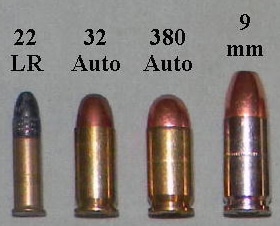
At this point it should be clear, .22 Long Rifle is not a sufficient caliber for self defense. However, that does not mean .22 LR pistols are useless.
They're a great way to cheaply get comfortable with handguns, while learning the basics of shooting. And when I say cheap, I mean the .22 ammunition is REALLY cheap. It's currently around 1/4 the price of 9mm ammo, making it reasonable to buy a .22 LR caliber pistol for practice shooting or recreational use.
Let's assume you can find .22 LR ammunition for $0.05 per round, while 9mm costs $0.20. After 2,000 rounds, you'd have saved nearly enough to pay for a cheap .22 caliber pistol or a .22 adapter (like this one for Glock 17&22 or 19&23 models).
When I took my mother to shoot a handgun for the first time, I started her out on a .22. I'd strongly recommend doing the same for anyone you know who is nervous about shooting for the first time.
While .22 pistols should be treated with as much safety as any other firearm, it does almost feel like you're shooting a BB gun or an airsoft gun.
- Common Bullet Weights: 36 gr, 40 gr
- Common Bullet Velocity Range: 1080-1280 ft/s
- Common Energy Range: 104-146 ft.lbf
- Price Per Round: $0.05-$0.07
Our recommendations for the best .22 pistols and revolvers.
.32 ACP
I don't want to spend too much time on 32 ACP, because I generally think it's a silly caliber to choose. It's a fairly uncommon caliber, making ammunition significantly more expensive than .380 ACP, while also being (according to many) far less effective for self-defense. I also feel that if you can comfortably shoot .32 ACP, you can almost certainly shoot .380 ACP.
- Common Bullet Weights: 60 gr, 71 gr
- Common Bullet Velocity Range: 900-1100ft/s
- Common Energy Range: 128-162 ft.lbf
- Price Per Round: $0.38-$0.52
.38 Special
.38 Special is a common "entry level" pistol caliber for those looking to use a revolver for self defense. As I mentioned earlier, this was the standard caliber for the FBI and law enforcement, until they began switching to semi-automatic pistols.
Due to numerous larger calibers found in revolvers, it's often assumed that all revolvers have large recoil. While this is true of larger calibers, I don't feel .38 special is any more difficult to shoot than a 9mm pistol. In fact, the kinetic energy range is actually lower than 9mm bullets.
- Common Bullet Weights: 110 gr, 125 gr, 130 gr, 158 gr
- Common Bullet Velocity Range: 760-950 ft/s
- Common Energy Range: 180-284 ft.lbf
- Price Per Round: $0.32-$0.40
.357 Magnum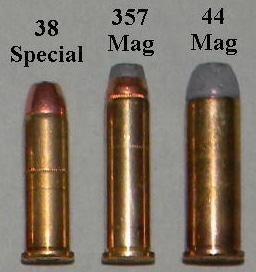
This is the caliber where it can start to really become difficult to shoot. The big step up in energy can result in pretty significant felt recoil, particularly when shooting .357 out of a lightweight revolver.
Typically, it's fine to shoot .38 special out of a .357 magnum firearm. You can't, however, shoot .357 out of a firearm designed for just .38 special, due to the greater pressure of .357. Always reference your firearm's manual for its ammunition guidelines.
- Common Bullet Weights: 125 gr, 158 gr
- Common Bullet Velocity Range: 1200-1500 ft/s
- Common Energy Range: 505-759 ft.lbf
- Price Per Round: $0.42-$0.68
.44 Magnum and Larger Calibers
.44 Magnum is the pistol caliber where things start to get pretty silly for most people's handgun needs. It's quite expensive ammo, and most people will find it uncomfortable to shoot.
